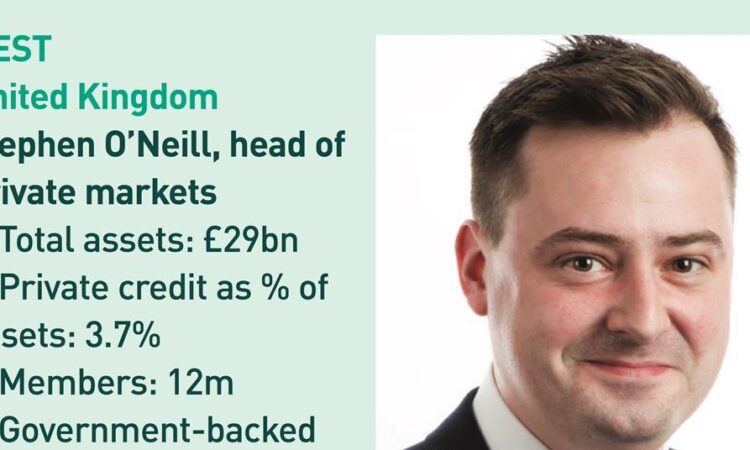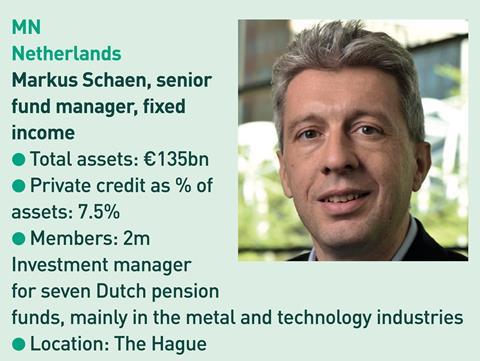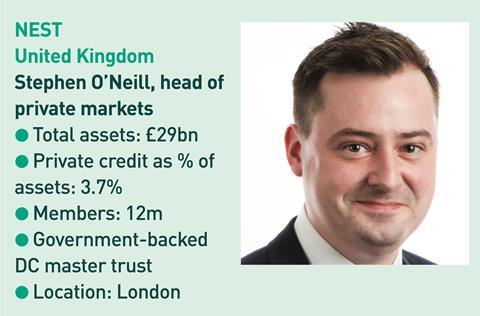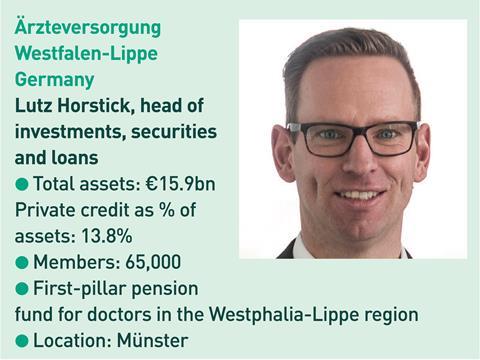
Targeting specific areas of private credit

Our first private credit investments go back decades, when we had exposure to so-called Dutch Onder- handse leningen, which are bilateral loans between pension funds and Dutch corporate and municipal borrowers. These days the private credit portfolio consists of senior European infrastructure debt, Dutch residential mortgages and co-investing loans with banks to corporates.
We are implementing our private corporate debt strategy, enabling us to invest in investment grade and high-quality high-yield rated private debt from European corporates. There is also room for impact investments.
We do not allocate to private credit in general, but specifically to each different sleeve within the asset class. All these sleeves, excluding Dutch resi- dential mortgages, fall into the return portfolio.
Manager selection is done by our inhouse teams. The selection process for private credit is based on the process for liquid fixed-income strategies, tweaked to take into account the nature of the un- derlying market. More attention is given to access to market, sourcing, importance of the asset class for the manager, internal ratings, valuation, and the expected long-term presence in the market.
Both our Dutch residential mortgage and infrastructure debt portfolios have done well so far. We started ramping up the mortgage portfolio at the beginning of the last decade. Since then, there have been various challenging situations for homeowners, such as COVID, the cost of living crisis, rising interest rates and falling house prices, but so far in every crisis the uptick in arrears was marginal.
We started investing in infrastructure debt at the beginning of this decade. The past three years were an excellent test case for its resilience.
Our first infrastructure transaction was done in 2020; the portfolio now consists of about 20 deals. There have been a few waivers, some (temporary) downgrades and one transaction moved to the watch list, but no credit events or impairments.
Strategy involves three private credit mandates

Our first two mandates for private credit were announced in September 2019. We made an initial 12-month commitment, split between Amundi and BlackRock, and totalling between £400m (€465m) and £500m.
For private credit mandates, each investment manager is procured through an open competition in each asset class.
The focus of our due diligence is on the man- ager’s investment thesis and how they are set up to execute their strategy. This includes their ap- proach to responsible investing and managing environmental, social and governance (ESG) risks, as well as how their business is structured. We also emphasise value for money and low fees.
To date we have committed around £1.5bn across our three private credit mandates.
The largest allocation is to a diversified pri- vate credit fund managed by BNP Paribas, which includes US and European corporate loans, as well as European infrastructure and commercial real estate.
The second-largest mandate is focused on infrastructure debt, managed by BlackRock, while the third is a commercial real estate debt mandate managed by Amundi.
Our largest overall exposure is to infrastructure debt, although we are looking to increase the overall proportion in US middle-market loans, where we’ve seen the strongest performance.
The BlackRock fund, which is mostly fixed rate, had a challenging 2022. However, all our private credit investments are managed on a buy- and-hold basis and there have been no issues with the credit quality of the infrastructure debt investments.
We intend to continue to grow our private credit portfolio in the years to come.
Our largest asset class is 51.7% in global equi- ties, followed by 25.5% in bonds, 7.5% in property, 5% in infrastructure, 3.7% in private credit, 3.4% in sterling liquidity, 1.6% in commodities and 1.5% in private equity.
Current focus on funding infrastructure projects

Ärzteversorgung Westfalen-Lippe’s (ÄVWL) investment philosophy is based on dynamically developing principles. Fixed income is a supporting pillar for achieving plannable, market-independent returns. An additional core element is to achieve the broadest possible diversification.
Private credit as a component of the fixed income strategy has been in the portfolio as early as 1960, initially in the form of mortgage loan transactions for private housing construction. Subsequently, commercial real estate financing was added.
Since 2006, we have added ship and aircraft financing and corporate promissory notes for the German Mittelstand. Currently, the investment focus is on project financing in infrastructure.
Since 2012, we have also supplemented private credit with externally managed strategies to give us access to new market segments.
These include financing of merger and acquisi- tion transactions, as well as small and medium-sized enterprise financing in other European countries and the US.
In its manager selection, ÄVWL concentrates only on managers with an investment focus repre- senting a meaningful complement to existing direct investments. For this reason, investments in real estate debt funds, infrastructure debt or aviation debt, for example, are excluded, as ÄVWL already invests directly in this market.
We have significantly reduced activity in private real estate financing since 2009, while commercial real estate financing has doubled in the past five years.
Meanwhile, transport – ships/aircraft – has grown in proportion to the overall portfolio. Infra- structure has also grown but the focus has shifted. There is less financing in the oil and gas sector, and the preference now is for new business in renewa- bles and fibre optics.
ÄVWL’s overall asset allocation is: bonds and loans 28.7%, real estate 26.6%, alternatives 24.1%, cash 13.4% and equities 7.2%.






